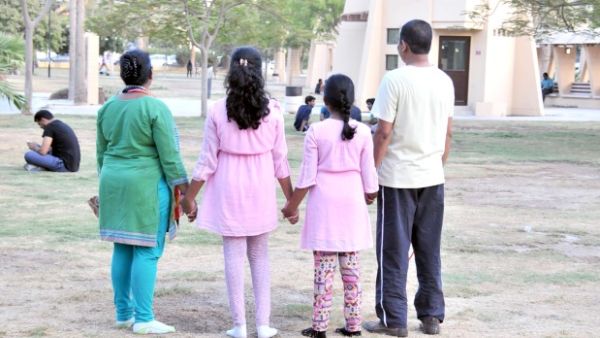Bahrain is being urged to reconsider a visa rule first announced in January, which threatens to break up some expatriate families.
The rule increased the minimum salary requirement of any foreign employee seeking a visa for dependants, such as a wife, husband or children.
Such visas used to be awarded to breadwinners earning at least BD250 a month, but in January it was announced the figure would rise to BD400.
Read More
Hundreds of Expats Suffer from Unpaid Wages in Bahrain
Video: Labors Live in Grimy Accommodation in Bahrain
The change only affects new applicants, with those already granted residence permits covered by an amnesty.
However, the amnesty for those earning below the threshold does not cover any new children they might have after the rule was implemented.
Choice
This means they face a difficult choice if they have a new child, either find a job paying better money or send their newborn to live abroad.
One father affected said two of his children could live with him and his wife in Bahrain, but his eight-month-old daughter would have to be sent to live with relatives in India.
“My two sons were born in India, but my daughter was born here in November,” he told the GDN yesterday on condition of anonymity.
“I earn BD250 and cannot get a dependant’s visa for my daughter because of the new rule and have no option but to send her back to India.”
Another Indian resident, who also asked to remain anonymous, said he was facing a similar dilemma after his son was born in April.
“I cannot get a dependant’s visa (for the newborn) because I earn less than BD400,” he said.
“My company will not increase my pay and I have no other option but to send my son to his grandparents in India.
“My wife and first child have no problem with their dependants’ visas because they are excluded from the new decision, but my younger son is being treated as a fresh case and does not qualify.”
Neither expat was prepared to go on record for fear of jeopardising the existing residence permits of their relatives.
Officials at Nationality, Passports and Resident Affairs (NPRA) referred the GDN’s request for a comment to the Labour Market Regulatory Authority (LMRA), where a call centre representative yesterday confirmed the BD400 minimum salary requirement applied to all new visa submissions for dependants.
Bahrain Contractors Society member Hisham Mattar defended the rule change, saying it was intended to account for rising costs of living.
However, he suggested a panel should be appointed to review appeals by applicants who earn below BD400 on humanitarian grounds.
“The cost of living has gone up in the past few years and it’s difficult for an expat to sponsor his dependants and look after them with a BD250 monthly salary,” said Mr Mattar.
“In my view, a special committee should be set up to review each case and give special consideration on humanitarian grounds.”
Meanwhile, Bahrain Small and Medium Enterprises Society chairman Dr Abdul Hassan Dairi said a smaller increase in the threshold would have been easier to swallow.
“You cannot jump from BD250 to BD400 because it affects the entire chain, from the worker to the businessman,” he said.
“It should be a gradual process.
“Any new decision should consider its impact and have mercy on all stakeholders.”
He suggested alternative solutions could be in the interests of all parties.
“We have to be considerate because we are dealing with human beings, not machines,” he added.
“Another option is to be flexible in the rules, allowing expats to pay a nominal fee to sponsor their families – or provide some sort of bank guarantee that reflects their financial position.”
Bahrain India Society chairman Mohammed Dadabhai agreed that exemptions should be made on humanitarian grounds.
He also proposed allowing dependants to work once they are in Bahrain, enabling the family unit to generate additional legitimate income.
“I think preference should be given on humanitarian grounds in this situation,” he said.
“Even families who arrive on dependants’ visas should be allowed to work.
Improve
“I would also like to see expats work hard and raise their profile, so they earn at least BD400 – this will help improve their standard of living.”
General Federation of Bahrain Trade Unions (GFBTU) assistant secretary for international relations, Karim Radhi, urged authorities to put workers’ welfare first.
“We always talk about foreign remittances and blame workers for sending money abroad, draining our national wealth,” said Mr Radhi.
“But when it comes to workers being with their families, we put obstacles in their way.”
Expats account for more than half of Bahrain’s population, with figures released last November putting the figure at 823,000 expatriates (55 per cent), compared with 677,000 Bahrainis.








